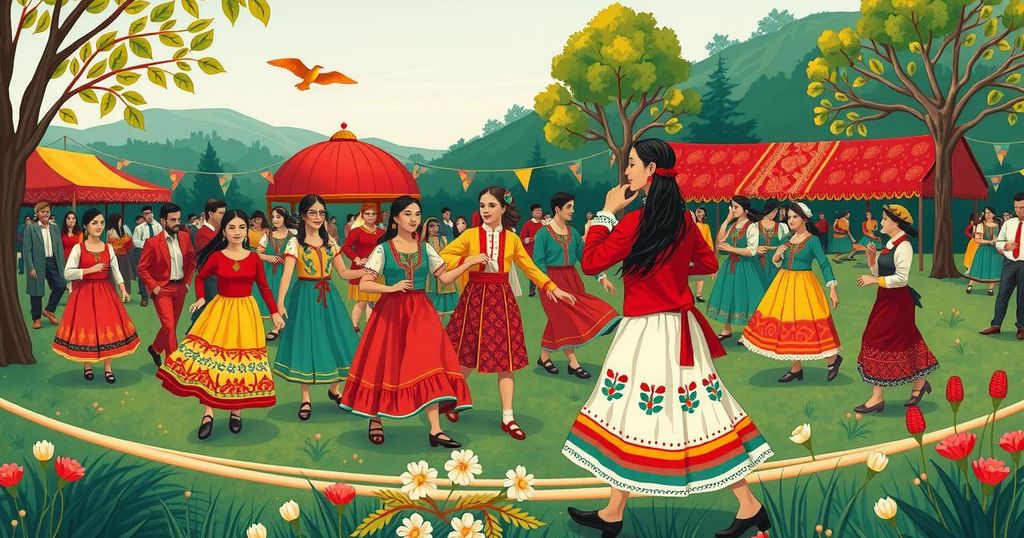Distrust Erodes Peace Process Hopes in Turkey’s Kurdish Heartland

The article discusses the deepening distrust among Kurds regarding Turkey’s peace process with the PKK, fueled by severe government crackdowns and opaque reform plans. With stakeholders expressing skepticism despite peace offers, recent calls for dialogue and recognition of Kurdish cultural events suggest potential, yet complicated, pathways toward stability.
In Turkey’s Kurdish heartland, widespread distrust shadows the peace process aimed at resolving a 40-year conflict with Kurdish militants. The Turkish government’s intensified crackdowns and the lack of clarity regarding potential reforms following these efforts are cultivating skepticism among Kurdish communities, who are eager for signs of tangible progress to enhance political and economic stability within the nation, especially in its southeastern regions.
Abdullah Ocalan, the imprisoned leader of the Kurdistan Workers Party (PKK), recently called for the PKK’s disbandment, a move interpreted as beneficial for President Erdogan’s administration. The pro-Kurdish Peoples’ Democratic Party (DEM) demands concrete steps towards democratization in connection with peace efforts. In response, the PKK announced a ceasefire and emphasized the necessity for Ocalan to oversee the disarmament process to establish enduring peace conditions.
Interviews with local Kurdish politicians and citizens indicate that skepticism towards the peace initiatives frequently overshadows optimism. The recent arrest of Istanbul Mayor Ekrem Imamoglu has provoked significant public protests, further complicating the peace atmosphere. “We are entering a minefield. It could go off the rails and end in failure. That’s possible,” stated DEM lawmaker Cengiz Candar, highlighting the precarious nature of current developments.
Although the DEM Party has engaged with Ocalan about peace prospects, they report a lack of communication from Ankara regarding a definitive reform plan. Erdogan’s minimal commentary on the peace process has not alleviated concerns. He stated, “The democratic space for politics will naturally expand further after disarmament,” but has not elaborated further since Ocalan’s appeal.
Curiously, a harmonizing sentiment appeared during the Newroz spring festival, where Erdogan proposed commemorating it as a national holiday, coinciding with a DEM parliamentary initiative. The festival, historically linked to conflicts, has the potential to foster unity, yet distrust persists in regions like Sirnak, where state authorities maintain strict oversight.
The PKK, classified as a terrorist organization by Turkey and its allies, has expressed lingering mistrust towards governmental actions, asserting that military operations have continued unabated despite Ocalan’s peace overtures. A PKK representative remarked, “Since Ocalan announced his initiative for peace, Turkey has not stopped its attacks or reduced its military operations,” demanding demonstrable concessions from Turkey as a precursor to further dialogue.
The lingering ramifications of past violence remain palpable; many locals express doubt concerning the peace process. Omer Iler, an imam in Diyarbakir, acknowledges prior injustices but also shares uncertainty regarding forthcoming reforms. Local sentiment reflects a history marked by betrayal, as individuals like a 63-year-old retiree named Bahadir articulated: “The state has deceived us many times. Many times the PKK has declared ceasefires, but for nothing.”
The last serious overture towards peace disintegrated in 2015, coinciding with the rise of the Kurdish YPG militia in Syria, instigating significant government wariness of similar negotiations. Amidst these challenges, Erdogan aims to cultivate consensus around a new constitution that might garner Kurdish support, knowing this could facilitate his political ambitions while balancing concerns from other segments of the Turkish population.
There are indications of a potential shift, as Erdogan recently signaled a willingness to engage with opposition leaders. His nationalist ally, Devlet Bahceli, is urging a swift resolution of the peace process, which could potentially alter public perception regarding both Ocalan and the PKK. “From this, we understand that this is going somewhere despite all these negative images,” Candar noted, reflecting on the delicate interplay of hope and tension in Turkey’s evolving landscape.
In conclusion, the tentative peace process in Turkey’s Kurdish regions is hindered by deep-seated distrust stemming from governmental crackdowns and insufficient transparency regarding reforms. Both Kurdish political representatives and the PKK express skepticism about the peace overtures, influenced by historical grievances and ongoing military actions. Nevertheless, recent dialogues surrounding symbolic gestures, like the recognition of the Newroz festival and potential constitutional changes, coupled with Erdogan’s openness to discussions, suggest the possibility of gradual progress, albeit fraught with complexities and challenges ahead.
Original Source: www.marketscreener.com







